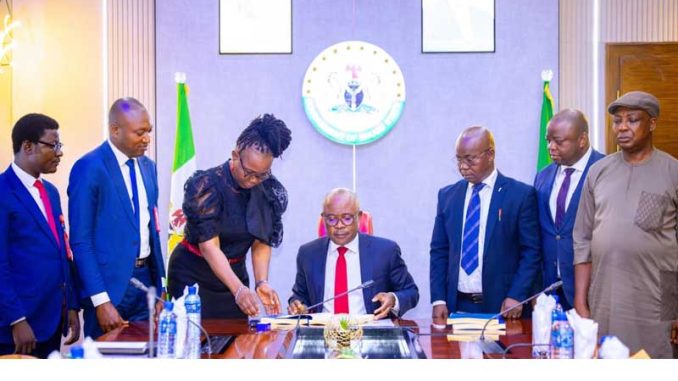
Governor Peter Mbah of Enugu State has signed into law a bill establishing a one-stop shop for tax collection and administration in the state, effectively ending the issue of multiple taxation.
Titled the Enugu State Internal Revenue Service (Establishment and Consolidation of Revenue Administration) Law, 2025, this new legislation grants the revenue collection agency autonomy, removing bureaucratic obstacles.
Speaking at the brief bill signing ceremony at Government House, Enugu, on Tuesday, Mbah hailed the law as a significant achievement in his administration’s efforts to improve the Ease of Doing Business and position the state as a premier investment destination.
“I recall numerous discussions with the business community, the organised private sector, and market traders, all expressing frustration over multiple taxation. Today, that challenges comes to an end.
“With this new legislation, there is now a single revenue collection point for everyone—from market traders to businesses and various government agencies. Individuals will have one clear location to pay their taxes and will receive the appropriate receipts, eliminating any other collection on behalf of the government.
“This change is vital; a core indicator of the Ease of Doing Business is ensuring that tax payments are straightforward and that there are no multiple channels demanding payments.”
According to the governor, the new law will effectively streamline revenue collection for both state and local governments, ensuring that each tier receives its due share, similar to the existing arrangements for land charges and Value Added Tax (VAT).
“The concept is to establish a single collection point while ensuring that revenue is properly allocated to the respective levels of government.
“It is crucial to clarify that the Enugu State Internal Revenue Service collecting on behalf of other tiers of government is not a novel idea. For example, Land Use Charges are paid to local governments but collected by the state. What we are now doing is consolidating all other revenue types to maintain this single point of collection, marking a significant milestone that will provide us with comprehensive oversight of our state revenues,” he stated.
He further explained that the Enugu State Inland Revenue Service will henceforth operate autonomously.
“The Enugu State Inland Revenue Service is now positioned as an independent institution within the state government. This autonomy empowers them to set targets and endeavour to meet those targets like a business, including the authority to hire and fire staff. We are committed to making the Revenue Service a professional entity,” he added.
Mbah also took the opportunity to clarify misconceptions surrounding the substantial increase in the state’s Internally Generated Revenue (IGR), attributing it to broadening the tax net, addressing revenue leakages, and implementing technology—not increasing tax rates.
“Let me clarify, we have not raised any taxes in Enugu State. Our revenue growth stems from expanding the tax base and ensuring that cash collections are properly accounted for and deposited into state treasury,” Mbah stated.
He expressed gratitude to the Enugu State House of Assembly for their steadfast support and for their prompt treatment of executive bills.
Earlier, the Speaker of the Enugu State House of Assembly, Hon. Uchenna Ugwu, characterised the bill as a pivotal moment for revenue collection in the state.
“This will enhance the Ease of Doing Business, improve the state’s IGR, and eliminate all loopholes in revenue collection and administration. It is a significant benefit for the people of Enugu State,” he said.



